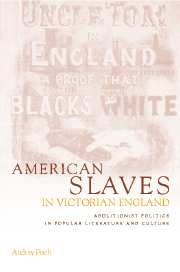Book contents
- Frontmatter
- Contents
- Acknowledgments
- Introduction:Communicating “a correct knowledge of American Slavery”: J. B. Estlin and the “breeder” in Frederick Douglass's Narrative
- 1 “Exhibiting Uncle Tom in some shape or other”: the commercialization and reception of Uncle Tom's Cabin in England
- 2 Abolition as a “step to reform in our kingdom”: Chartism, “white slaves,” and a new “Uncle Tom” in England
- 3 “Repetitious accounts so piteous and so harrowing”: the ideological work of American slave narratives in England
- 4 “Negrophilism” and nationalism: the spectacle of the African-American abolitionist
- Epilogue:“How cautious and calculating”: English audiences and the impostor, Reuben Nixon
- Notes
- Bibliography
- Index
1 - “Exhibiting Uncle Tom in some shape or other”: the commercialization and reception of Uncle Tom's Cabin in England
Published online by Cambridge University Press: 20 February 2010
- Frontmatter
- Contents
- Acknowledgments
- Introduction:Communicating “a correct knowledge of American Slavery”: J. B. Estlin and the “breeder” in Frederick Douglass's Narrative
- 1 “Exhibiting Uncle Tom in some shape or other”: the commercialization and reception of Uncle Tom's Cabin in England
- 2 Abolition as a “step to reform in our kingdom”: Chartism, “white slaves,” and a new “Uncle Tom” in England
- 3 “Repetitious accounts so piteous and so harrowing”: the ideological work of American slave narratives in England
- 4 “Negrophilism” and nationalism: the spectacle of the African-American abolitionist
- Epilogue:“How cautious and calculating”: English audiences and the impostor, Reuben Nixon
- Notes
- Bibliography
- Index
Summary
This picture of life in the Slave States of America undoubtedly owes some of its interest to the novelty of its subject. Manners, domestic economy, sketches of scenery, and “interiors,” which if drawn in England would attract little attention although equally well done, have the charm of freshness when displaying a state of society which is sufficiently removed from our own to be new yet not so remote as to be strange. If, however, these advantages were put aside, Uncle Tom's Cabin would still be very remarkable as an artistic production, whether considered merely as a romance or as a didactic fiction.
(“Uncle Tom's Cabin,” Spectator, 926)So begins a review of Uncle Tom's Cabin carried on September 25, 1852, in the Spectator. Harriet Beecher Stowe's novel is praised both as “romance,” on the grounds of its artistic merits, and as “didactic fiction,” on the grounds of its abolitionist politics. The review goes on to tell English readers that Stowe's novel “has produced a great sensation in America” (928) and confidently asserts that the popularity of the novel in England, “equally great,” is the result in part of English interest in the charming freshness of American society.
A notice of a theatrical production of Stowe's novel carried on December 4, 1852, in the same journal offers an entirely different opinion. Under the heading “The Theatres,” the notice begins with an argument showing “that both form and substance preclude Uncle Tom's Cabin from anything like adequate representation on the stage” (1160).
- Type
- Chapter
- Information
- American Slaves in Victorian EnglandAbolitionist Politics in Popular Literature and Culture, pp. 11 - 32Publisher: Cambridge University PressPrint publication year: 2000



